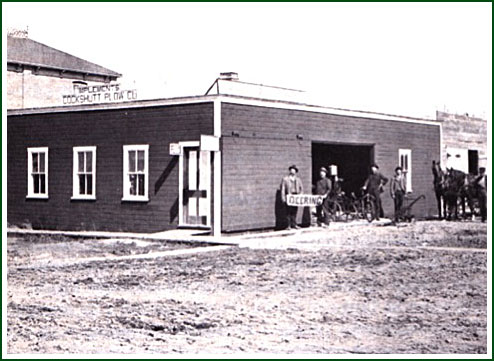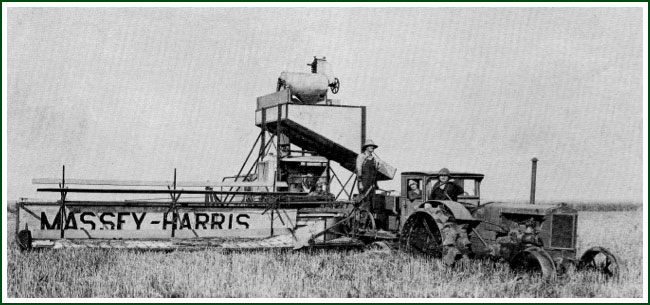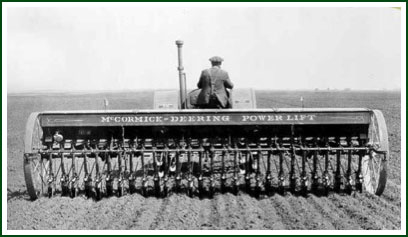|
Having
left Iceland in 1873, there is record of him at Kinmount, Ont. in 1875,
where the group of immigrants secured work building the railway. In the
same year he joined a small delegation to explore the Red River Valley
as a possible site for the Icelandic colony. Obtaining a large enough
block of land eventually led them to the shore of Lake Winnipeg, with
Christian Johnson settling at Vidines where Christian is recorded to
have been the schoolteacher at Vidines on Sundays and Wednesdays.
Early in 1880, together with a small delegation, he traveled by
rowboat, steamship and on foot to the Tiger Hills and the Argyle
settlement. With him was Sigurdur Christopherson, the first Icelander
to file entry on a homestead at Grund. Christian Johnson also filed
shortly after and these lands remain with the family today.
He appears to have been a lively participant in politics, church and
community. Like virtually all the Icelanders, he was a vigorous Liberal
and was chief returning officer for Mountain in 1892. As the Reeve of
Argyle in 1896, he is reported to have "served with resolution and
dignity".
He was also on the Baldur’s earliest and most influential buisinessmen.
In 1893 he established an implement dealership in Baldur on the lot
where Alex Fowler built his block in 1899.
He later moved to the corner of Elizabeth and First. In
September, 1899, and built an additional warehouse 30 feet by 50
feet.
Adapted from Come into our Heritage, page
494. & 154
Quote from The Baldur Gazette Special Historical
Edition, 1940:
"Mr. Christian Johnson, the industrious and progressive Deering
Implement Agent, has had his commodious warerooms painted, a chimney
built over the office, and a handsome sign placed on the front street
end of the building. Mr. Johnson has the largest and most commodious
implement rooms of any machine agent in the province."
Christian's sons, Jack and Thomas, joined the business and the business
continued under the name C. Johnson and Sons after Christian's death in
1918. Jack died in 1935, and Tom continued until 1947, when this
business, known as the John Deere Agency, was sold to Andres
Anderson.
 Chris Johnson’s Implement Agency
at Elizabeth & 1st
Chris Johnson’s Implement Agency
at Elizabeth & 1st
Implement Dealers
Christian Johnson’s business as an implement dealer was a key one in
Baldur, and one that many other individuals also attempted over the
years. All would have been very familiar with all lines of farm
machinery, and of the firms that manufactured them.
Prior to 1900, all manufacturing consisted of short-line companies:
full-line companies emerged primarily as a means to overcome
competition. International Harvester Company (IHC), for instance, was
formed in 1902 as an amalgamation of the five largest existing
manufacturers of harvest equipment at the time.
Canada had two full-line companies: Massey-Harris (later to become
Massey-Harris-Ferguson, and finally Massey-Ferguson) and Cockshutt,
both located in the Hamilton region of Ontario. The Massey Company at
one time was the world’s largest manufacturer of farm equipment;
however, it fell on hard times and went into receivership in 1988.
It is important to make the connection between the blacksmith shop and
farm equipment manufacture, as it has often been said that the
innovations and progressive ideas for machinery improvements largely
came from farmers.

Perry and Edna Cowan and Nellie
Carter in 1928.
Key Farm Implements at 1900
Gang Plow – a combination of two or more plows in one frame
Harrow – implement for breaking up soil
Broadcast Seeder – used for spreading seed
Swather – machine to cut hay and cereal crops
Thresher – machine used to separate grain from stalks and husks
Wagons
All of these pieces of machinery were typically drawn by horses and
eventually tractors.
The Massey-Harris Company
The firm was founded in 1847 in Newcastle, Ontario by Daniel Massey as
the Newcastle Foundry and Machine Manufactory. The company began making
some of the world's first mechanical threshers, first by assembling
parts from the United States and eventually designing and building
their own equipment. The firm was taken over and expanded by Daniel's
eldest son Hart Massey who renamed it the Massey Manufacturing Co. and
in 1879 moved the company to Toronto where it soon became one of the
city's leading employers. The massive collection of factories,
consisting of a 4.4 hectare (11 acre) site with plant and head office
at 915 King Street West, became one of the best known features of the
city. Massey expanded the company and began to sell its products
internationally. Through extensive advertising campaigns he made it one
of the most well known brands in Canada..
In 1891, Massey merged with the A. Harris, Son & Co. Ltd. to become
Massey-Harris Co. and became the largest agricultural equipment maker
in the British Empire. The company made threshing machines and reapers
as well as safety bicycles, introducing a shaft-driven model in 1898.
In 1910, the company acquired the Johnson Harvester Company located in
Batavia, New York, making it one of Canada's first multinational firms.

A disc seeder in operation.
|





